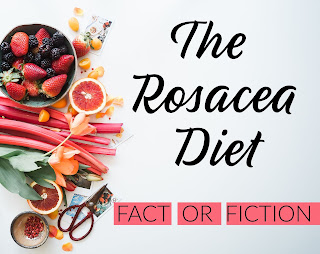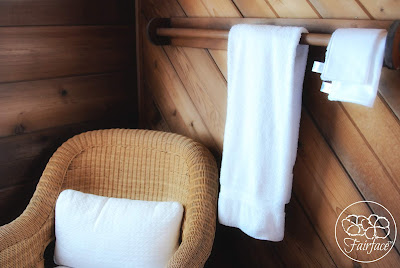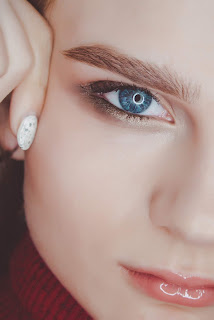 |
| photo: brooke lark on unsplash |
If I told you there was an easy solution to reducing your Rosacea flares just by what you ate every day, would you believe me? Is there really such a thing as a Rosacea Diet?
This topic is a personal one for me, since I have had Rosacea for just over 10 years. Can what we eat every day really help reduce our flares and ease and calm Rosacea? I decided to find out.
DOES WHAT WE EAT EFFECT OUR SKIN AND ROSACEA?
We know diet does indeed have an effect on our skin. Not drinking enough water = dehydrated skin; eating foods that trigger our skin to react = acne, hives, redness, rosacea flares. Food and skin are not independent of one another.
THE DIET - ROSACEA CONNECTION
Rosacea Trigger foods
Foods that cause a reaction or aggravation of Rosacea on the skin, causing it to flare-up, including flushing, itching, redness and acne like bumps called Pistules, are often called trigger foods. (see Rosacea.org for a lists of common food triggers)
What I know personally, is that my Rosacea gets worse when I eat sugar. Without fail, every time I drink a can of soda, or eat sugary treats, I can count on having a Rosacea flare either within a few hours or at least by the next morning. Sometimes I still eat or drink it on purpose and gauge whether it's "worth the risk" while other times I won't touch it. I have a big sweet tooth so avoiding sugar is really hard for me and I'm not always successful, but I do know sugar is one of the things that will bring my Rosacea out of hybernation, even if it has been calm for a while.
Inflammation
Your body's way of protecting and defending itself against injury, illness or infection, is called inflammation. It can be situational or chronic and while you can't always see inflammation going on inside your body, it can show up on your skin as redness, swelling, heat and irritation.
Eating too much sugar is linked to inflammation in the body.
Rosacea is a chronic, inflammatory skin condition affecting the face.
According to Rachel Devine, a holistic aesthetician, & creator of a certified organic skin care line, "Every single skin condition is caused internally."
Source: Room to Grow Podcast Episode #15 by Emily Gough
Read that again. It's so powerful and makes so much sense.
She went on to say, "Just because (our skin) is an external organ, a lot of people forget that it's an organ and when there's inflammation on the skin (Rosacea, acne or anything like that) it's really important to think of it at that point as being an organ...because if our liver's inflamed, we're going to do something about it. But a lot of people think, "oh my skin's inflamed I've just got to put some chemicals on there and hopefully it will all go away", but it doesn't work like that."
CHANGING OUR DIET CAN HELP REDUCE ROSACEA FLARES
My Rosacea Diet Test
 |
| photo: jason briscoe on unsplash |
In a survey by the National Rosacea Society, 73% of Rosacea participants reduced occurrences of rosacea flare-ups by changing their diets (N=516).
So a couple months ago I decided to put this idea to the test: would changing my diet really improve my skin? To be totally honest, my "new diet" really came from the fact that I was tired of squeezing myself into my tight pants, but clearer skin might be a bonus? Right?
What I did every day:
- Ate tons of veggies like a crazy person. And I do mean crazy. Like brussels sprouts and broccoli for breakfast kind of crazy. And an overabundance of veggies at every meal - sometimes they were even the main course (gasp!)
- Eliminated high inflammation foods like bread, crackers, gluten, processed sugars, ice cream, soda pop, most dairy
- Ate a variety of fruits and added them to smoothies along with spinach, carrots, kale, & almond milk
- Ate lots of salmon
- Ate less lean meats
- Ate nuts for snacks
- Exercised at least 30 minutes a day (walked on a treadmill & biked outside)
- Drank a lot more water
RESULTS
What happened?
My skin looked really good.
And I'm not just saying that.
For real, I would look in the mirror and think, wow, I can really see a difference.
I think my skin had been dehydrated but also malnourished. While I did all the right things on the
outside of my skin everyday, I hadn't been doing all the right things on the inside. And it really did make a difference.
THE ROSACEA DIET: HEALING FROM THE INSIDE-OUT
While there's no clear-cut "Rosacea Diet" with exact recipes and food plans to follow (because our bodies are all different), it's all about adapting our every day diet by adding and subtracting so we get less of the wrong things and more of the right ones.
Part of this equation is figuring out what your body likes and doesn't like. The National Rosacea Society suggests keeping a food diary to more easily track how your skin reacts to certain foods. For me, I know that eating mainly vegetables and fruits, fish and lean meats, while eliminating processed sugars, and certain carbs, and drinking more water helped my skin look clearer. For someone else, maybe a food allergy test would help to specifically identify foods that cause an inflammatory reaction in their body.
Here are some tips to start your own version of a Rosacea diet to help keep your skin clear and healthy
Step 1: SUBTRACT
1) Stop eating foods you know are bad for you and your skin (ie processed sugars and other foods that increase inflammation in the body).
2) Keep a food journal to track what you eat every day, how you feel and how your skin reacts to it.
3) Identify any new dietary triggers and inflammatory foods and eliminate them from your diet.
Step 2: ADD
1) Make eating clean, anti-inflammtory foods your goal
2) Turn yourself into a nutritional powerhouse by loading up your cells with vegetables, fruits, healthy fats (olives, avocados), salmon and foods with Omega 3s.
3) Create a notebook or Pinterest board and add your favorite healthy recipes to keep you motivated and inspired (check out Arthritis.org for lists of anti-inflammatory foods and recipes)
Be patient with yourself! This process does take discipline and time, but it will be worth it in the long run (and even short-term!) The benefits don't just stay with your skin, you may also lose some unwanted weight and be healthier.
Have you tried altering your diet to help combat your Rosacea? We'd love to learn about your experience. Leave us a comment below!
This article was written by Shannon Sorensen, M.A. Human Development, sensitive skin care advocate and founder of
Fairface Washcloths for sensitive skin.
Fairface Washcloths are an important addition to your skin care routine if you have Rosacea or sensitive skin. Gentle cleansing is vital to breaking the cycle of redness and irritation. Try
Fairface Washcloths today! Your skin will thank you.










